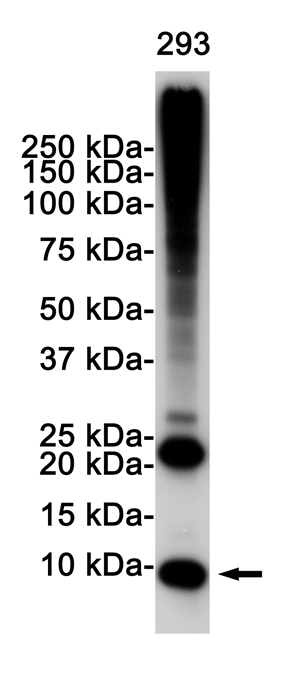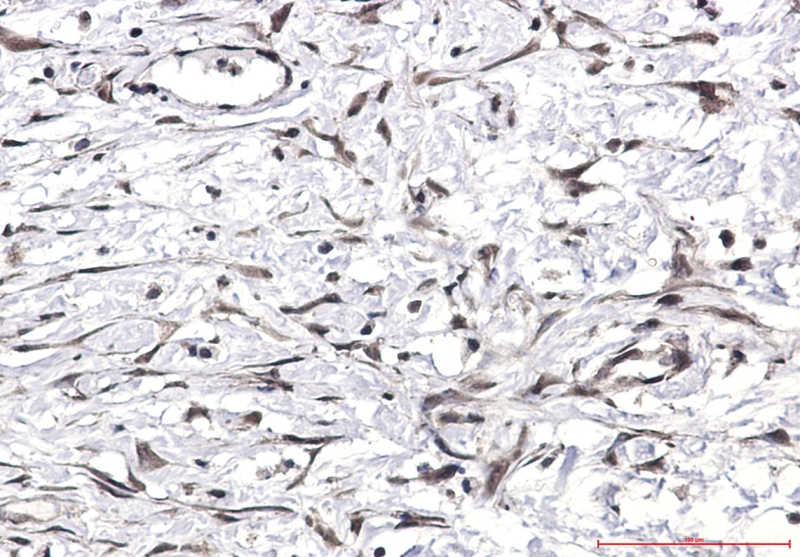

| WB | 咨询技术 | Human,Mouse,Rat |
| IF | 咨询技术 | Human,Mouse,Rat |
| IHC | 1/50-1/100 | Human,Mouse,Rat |
| ICC | 技术咨询 | Human,Mouse,Rat |
| FCM | 1/50-1/100 | Human,Mouse,Rat |
| Elisa | 咨询技术 | Human,Mouse,Rat |
| Aliases | FLJ25987; MGC8385; ubiquitin B; Ubiquitin; UBCEP1; UBCEP2; RPS27A |
| Entrez GeneID | 7314 |
| WB Predicted band size | Calculated MW: 26 kDa; Observed MW: 8 kDa |
| Host/Isotype | Rabbit IgG |
| Antibody Type | Primary antibody |
| Storage | Store at 4°C short term. Aliquot and store at -20°C long term. Avoid freeze/thaw cycles. |
| Species Reactivity | Human |
| Immunogen | A synthetic peptide of human Ubiquitin |
| Formulation | Purified antibody in TBS with 0.05% sodium azide,0.05%BSA and 50% glycerol. |
+ +
以下是3-4条关于泛素(Ubiquitin)抗体的参考文献及其简要摘要:
1. **"The ubiquitin system"**
*作者*:Hershko, A., & Ciechanover, A.
*摘要*:经典综述,概述泛素-蛋白酶体系统的功能,包括泛素化过程的关键分子机制及实验工具(如泛素抗体的应用),为后续抗体开发奠定理论基础。
2. **"Recognition of the polyubiquitin proteolytic signal"**
*作者*:Thrower, J. S., Hoffman, L., & Finley, D.
*摘要*:研究多聚泛素链作为降解信号的识别机制,使用特异性泛素抗体验证不同泛素链类型(如K48/K63连接)在蛋白酶体靶向中的作用。
3. **"A proteomics approach to understanding protein ubiquitination"**
*作者*:Beers, E. P., & Kaiser, P.
*摘要*:描述基于泛素抗体的蛋白质组学方法,用于富集和鉴定泛素化底物,强调抗体在Western blot和免疫沉淀中的特异性要求。
4. **"Ubiquitin-binding domains — from structures to therapeutics"**
*作者*:Harper, S., & Schulman, B. A.
*摘要*:解析泛素结合结构域(UBDs)的结构与功能,提及利用泛素抗体研究泛素-受体相互作用,为疾病相关泛素信号异常提供干预策略。
注:以上文献为泛素抗体应用的代表性研究,实际引用时建议根据具体研究方向(如抗体验证、实验方法)筛选最新或更相关的论文。
Ubiquitin antibodies are essential tools in studying the ubiquitin-proteasome system (UPS), a critical pathway for protein degradation and regulation in eukaryotic cells. Ubiquitin, a highly conserved 76-amino-acid protein, tags target proteins via covalent conjugation (ubiquitination) to regulate their stability, localization, or activity. This post-translational modification involves a cascade of E1 (activating), E2 (conjugating), and E3 (ligase) enzymes. Polyubiquitination typically marks proteins for proteasomal degradation, while monoubiquitination or specific chain linkages (e.g., K48. K63) mediate non-degradative processes like DNA repair or inflammation.
Ubiquitin antibodies are designed to detect ubiquitin or ubiquitinated proteins in various experimental settings, including Western blotting, immunohistochemistry (IHC), immunofluorescence (IF), and immunoprecipitation (IP). They are crucial for studying diseases linked to UPS dysregulation, such as cancer, neurodegenerative disorders (e.g., Alzheimer’s, Parkinson’s), and autoimmune conditions. Monoclonal antibodies offer high specificity for ubiquitin epitopes, while polyclonal variants may detect diverse ubiquitin conjugates. Some antibodies distinguish free ubiquitin from conjugated forms or recognize specific chain linkages. Researchers must validate these antibodies carefully, as cross-reactivity or batch variability can affect results. Ubiquitin antibodies also aid in drug development, particularly for therapies targeting E3 ligases or deubiquitinating enzymes (DUBs). Their application continues to expand with advances in understanding ubiquitin’s role in cellular homeostasis and disease.
×